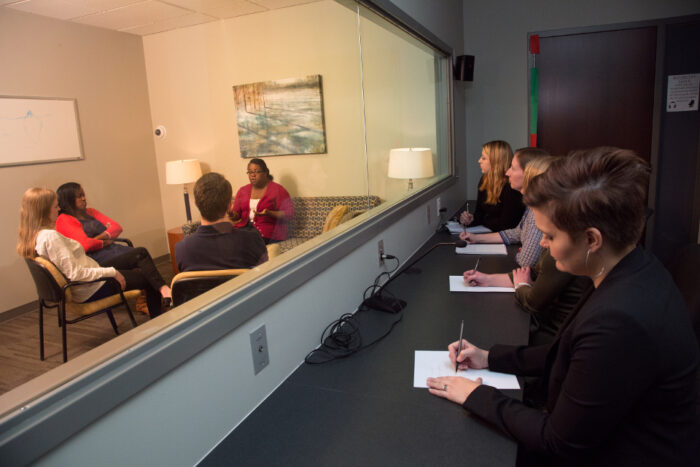 The Couples and Family Therapy Training through Role-Play program at Jonah Green and Associates (“JGA”) is a unique offering that builds on and revitalizes traditional family therapy training. It expands upon a rich “live” training tradition that has characterized family therapy training since its inception but has become less available in recent years. The program emphasizes the role-play method via a virtual format, providing direct practice and immediate feedback that is convenient, accessible, and affordable for trainees.
The Couples and Family Therapy Training through Role-Play program at Jonah Green and Associates (“JGA”) is a unique offering that builds on and revitalizes traditional family therapy training. It expands upon a rich “live” training tradition that has characterized family therapy training since its inception but has become less available in recent years. The program emphasizes the role-play method via a virtual format, providing direct practice and immediate feedback that is convenient, accessible, and affordable for trainees.
Development of Family Therapy
Family therapy developed during the postwar era at centers such as the Mental Research Institute in Palo Alto, California, the Georgetown Family Center in the District of Columbia, and the Philadelphia Child Guidance Clinic. Pioneers at these institutes, including Jay Haley, Murray Bowen, and Salvador Minuchin, developed concepts such as “circular causality,” the “emotional transmission process,” and “family structure” to understand family relationship dynamics and generate interventions to improve communication, build relationship bonds, and develop secure, cohesive family environments. The institutes trained clinicians to impact “family systems” via novel interventions such as paradoxical directives, reframing, “enactments,” boundary-making, genograms, psychoeducation, relational questioning, and exercises such as “family sculpting.” ‘Schools” of family therapy developed at many institutes, including Bowenian, Strategic, Structural, Milan, Cognitive-Behavioral, Experiential, Solution-Focused, and Narrative, while some institutes, such as the Ackerman Center in New York City, developed integrative approaches.
Growth of Direct Feedback Training
Recognizing the need to train family therapists in a variety of interventions amid rapidly shifting contexts, the training centers utilized “direct feedback” training, contrasting with methods used to teach individual therapy, which mainly involved reading, lectures, and supervision where trainees would discuss their work. The centers circumvented confidentiality concerns by offering clients reduced-fee therapy in exchange for observation of sessions. Utilizing technologies such as one-way mirrors, video recording, and telephones, the institutes provided students with real-time and post-session feedback; supervisors sometimes even “called in,” entered sessions, or offered input to clients and families via “reflecting teams.” Nearly all centers used role play, where trainees alternated between clients and therapists.

Generations of family therapists have recognized the unique value of the “live feedback” supervision at these centers. As Murray Bowen stated, “Live supervision offers a unique opportunity to observe and intervene in the therapeutic process as it unfolds, enhancing the therapist’s ability to understand and manage complex family dynamics.” Or another pioneer, Carl Whitaker: “The presence of a supervisor who can step in and guide the session ensures that therapists develop their skills in a real-world context is irreplaceable.” Or Michael White: “Being supervised live allows for a richer, more nuanced understanding of the therapeutic process, with feedback integrated immediately into practice.”
Despite the enthusiasm surrounding training at these institutes, the growth of the training centers slowed by the turn of the 21st Century. The popularity of family therapy seemed to have a “ceiling:” the need for coordination of schedules, difficulty measuring its effectiveness compared to individual CBT, and poor insurance coverage all impacted its growth. The institutes’ panoply of live training and various trainers proved expensive and time-consuming, limiting their appeal to instructors and trainees. Meanwhile, Marriage and Family Therapy (“MFT”) degree-granting programs, which began in the late 1970s, usually offered live feedback supervision. MFT programs have trained many skilled practitioners over the years; still, most clinicians who practice family therapy today have learned it through the “indirect” methods of reading, classes, and supervision.
Renewal of interest in direct feedback training
Several developments suggest the time is ripe to rejuvenate direct feedback training in family therapy. The pandemic saw an explosion of interest in relationship therapy. Several contemporary systemic approaches, such as Parent-Child Interaction Therapy, Emotion-Focused Therapy, Functional Family Therapy, and Attachment-Based therapy, now use live supervision. Streaming platforms have made these trainings more accessible. Some of the original training institutes have persisted and are using video platforms. The larger psychotherapy field, building on research showing the efficacy of live training in building clinical skills, has begun to adopt live training through placements and courses in therapeutic approaches such as Motivational Interviewing, Dialectical Behavioral Therapy, and Short-Term Dynamic Psychotherapy.
JGA’s Role-Play Training
JGA responded to these needs and opportunities by launching Family Therapy Training Through Role-Play during the pandemic. To provide direct, live training cost-effectively and sustainably, we focus on role-play, circumventing the need to find clients willing to be recorded or the complexity of syncing up the calendars of supervisors, therapists, and clients. Training through role-play has the bonus of increasing awareness of clients’ experiences, as the trainees “play the parts” of family members and therapists. Our program integrates multiple theoretical approaches as it trains students in a wide range of essential skills–joining, reframing, facilitating enactments, relational questioning, guiding experiential activities, using genograms, and more. We also delve into specific situations and populations, including trauma, disability, stepfamilies, and LGBTQIA+ families, ensuring a comprehensive training experience that is relevant to the diverse families of today’s society.
Through online role-play training, JGA is meeting the needs of a new generation of family therapists to build skills in a practical, affordable, and accessible way. We hope to provide a model for other programs to train practitioners to meet the needs of families in the years to come.